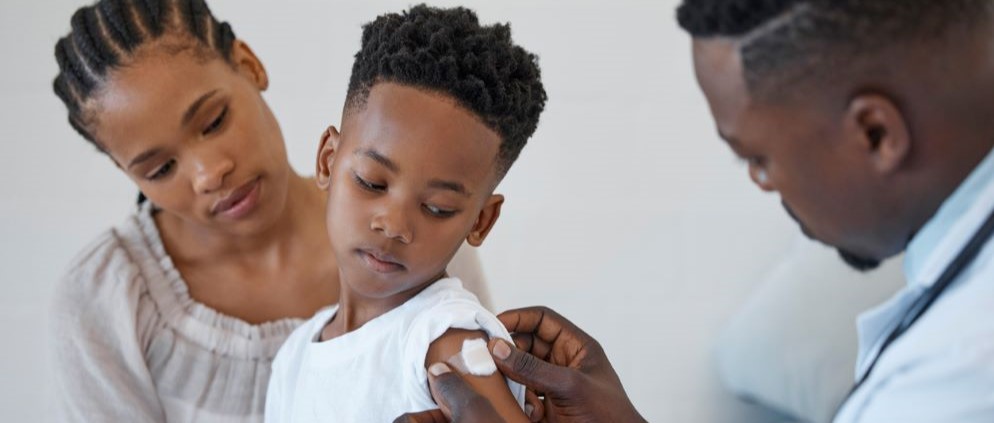Malaria vaccination: What you need to know
Since 2000, mortality from malaria has fallen thanks to prevention efforts, including insecticide-treated mosquito nets (ITNs), indoor residual spraying and antimalarial medicines.1 However, there has been an increase in deaths since 2020 and 2021.1 ‘Nearly every minute, a child under 5 years old dies of malaria.’2 This stark statement from Dr Ephrem T. Lemango, the Associate Director of Immunisation at the United Nations Children’s Fund (UNICEF), is sobering.
Africa accounted for 233 million cases of malaria in 2022, which was 94% of worldwide cases.3 What is more, four African countries contributed to nearly half of all global cases during that period: Nigeria, the Democratic Republic of the Congo, Uganda and Mozambique.3
Consequences of climate change on malaria
Climate change has been declared the single largest threat to human health by the World Health Organisation (WHO).3 Environmental and climatic factors influence vector-borne diseases.3 Malaria may be impacted by climate change, but this impact can’t be reliably predicted.3
However, what is known is that the dynamics of malaria transmission are affected by temperature, rainfall and humidity.3 The consequences of climate change could include:3
- Expansion of the areas affected by malaria
- Reintroduction of malaria into areas where it has been eradicated
- Increased costs and obstacles to delivering an anti-malaria programme
WHO malaria vaccination programme
The WHO Global Technical Strategy for Malaria aims to reduce the mortality rate and incidence of malaria by 90% by the year 2030 from a 2015 baseline.3 To this end, the WHO recommends a variety of methods to fight malaria, including the use of ITNs.3 The WHO also recognises the important role of recently developed vaccines. The first-ever malaria vaccine, RTS,S/AS01 has been delivered in Ghana, Kenya and Malawi since 2019.2 The vaccine was found to be safe and effective in more than 1.7 million children.2
Since the WHO recommended this vaccine in October 2021, other countries have requested it.3 In October 2023, the WHO recommended administering a second vaccine, the R21/Matrix-M, to children in areas of risk.3
More on this topic: Tripledemic may return to Europe this winter: Vaccination still key
Reception of malaria vaccination
The WHO reports that the current uptake is ‘high’ and vaccines are ‘reaching children who are not using other forms of malaria prevention.’3 Currently, although the efficacy of vaccination may appear ‘modest,’ given the huge numbers of cases of the disease, the overall impact of malaria vaccination is ‘expected to be huge.’1
Indeed, it has been estimated that if 30 million doses of the RTS,S/AS01 vaccine were administered at a sub-national level in African countries, the death of 24,000 children could be prevented annually.4 Between 2023 and 2025, 18 million doses of the RTS,S/AS01 vaccine will be allocated to 12 African countries.2 The WHO advises that the vaccines are more effective when given ‘just before the high transmission season.’3
The following dosing schedule is recommended:5,6
- The first of 3 of a total of 4 doses should be given at a rate of one per month.
- The final dose is due 12 months after the 3rd dose is given.
During the RTS,S/AS01 pilot, febrile convulsions were one of the serious adverse events reported.7 They occurred in 1/1000 doses with the first three doses of the vaccine.7 That number rose to 2.5/1000 doses with the fourth dose but was assessed by the authors to be in line with the, ‘expected age distribution of febrile convulsions’ and ‘triggered by vaccination-induced fever.’7
More on this topic: World Immunisation Week—vaccines and syringes then and now
Making it work
For the vaccination programme to be successful, families must actively participate.8 To this end, community health workers play an important role by reaching families who could benefit from the scheme.8 Abigail Applah-Agyei is a community health nurse working in Ghana. Regarding the pilot vaccination programme she says, ‘We tell mothers this vaccine is safe and effective and that we’ve seen the positive outcomes.’8
BD thinks the malaria vaccine could be a game changer. The BD role is to stand in support of global vaccination and immunisation campaigns and contribute to these efforts through the supply of injection devices.
References
- Gavi Alliance. Malaria vaccine market shaping roadmap. Published online April 2023. Accessed May 22, 2024. https://www.gavi.org/sites/default/files/white-paper/WPaper_malaria-roadmap.pdf
- World Health Organisation (WHO). 18 million doses of first-ever malaria vaccine allocated to 12 African countries for 2023-2025: Gavi, WHO and UNICEF. Published July 5, 2023. Accessed April 26, 2024. https://www.who.int/news/item/05-07-2023-18-million-doses-of-first-ever-malaria-vaccine-allocated-to-12-african-countries-for-2023-2025–gavi–who-and-unicef
- World Health Organisation (WHO). World malaria report 2023. Published online 2023. Accessed May 22, 2024. https://www.who.int/teams/global-malaria-programme/reports/world-malaria-report-2023
- Hogan AB, Winskill P, Ghani AC. Estimated impact of RTS,S/AS01 malaria vaccine allocation strategies in sub-Saharan Africa: A modelling study. PLoS Med. 2020;17(11):e1003377. doi:10.1371/journal.pmed.1003377
- Datoo MS, Dicko A, Tinto H, et al. Safety and efficacy of malaria vaccine candidate R21/Matrix-M in African children: a multicentre, double-blind, randomised, phase 3 trial. Lancet. 2024;403(10426):533-544. doi:10.1016/S0140-6736(23)02511-4
- World Health Organisation (WHO). WHO guidelines for malaria. Published 2023. Accessed June 20, 2024. https://files.magicapp.org/guideline/9331a09e-ce3b-4527-8536-ab358ec41ea0/published_guideline_7663-7_2.pdf
- Guerra Mendoza Y, Garric E, Leach A, et al. Safety profile of the RTS,S/AS01 malaria vaccine in infants and children: additional data from a phase III randomized controlled trial in sub-Saharan Africa. Hum Vaccines Immunother. 2019;15(10):2386-2398. doi:10.1080/21645515.2019.1586040
- World Health Organisation (WHO). Health workers: key to the success of the Malaria Vaccine Implementation Programme. Published November 23, 2023. Accessed May 14, 2023. https://www.who.int/news-room/photo-story/photo-story-detail/health-workers–key-to-the-success-of-the-malaria-vaccine-implementation-programme
This list of references to third-party peer-reviewed material and the sites they are hosted on are provided for your reference and convenience only, and do not imply any review or endorsement of the material or any association with their operators. The Third-Party References (and the Web sites to which they link) may contain information that is inaccurate, incomplete, or outdated. Your access and use of the Third Party Sites (and any Web sites to which they link) is solely at your own risk.
BD-126139




